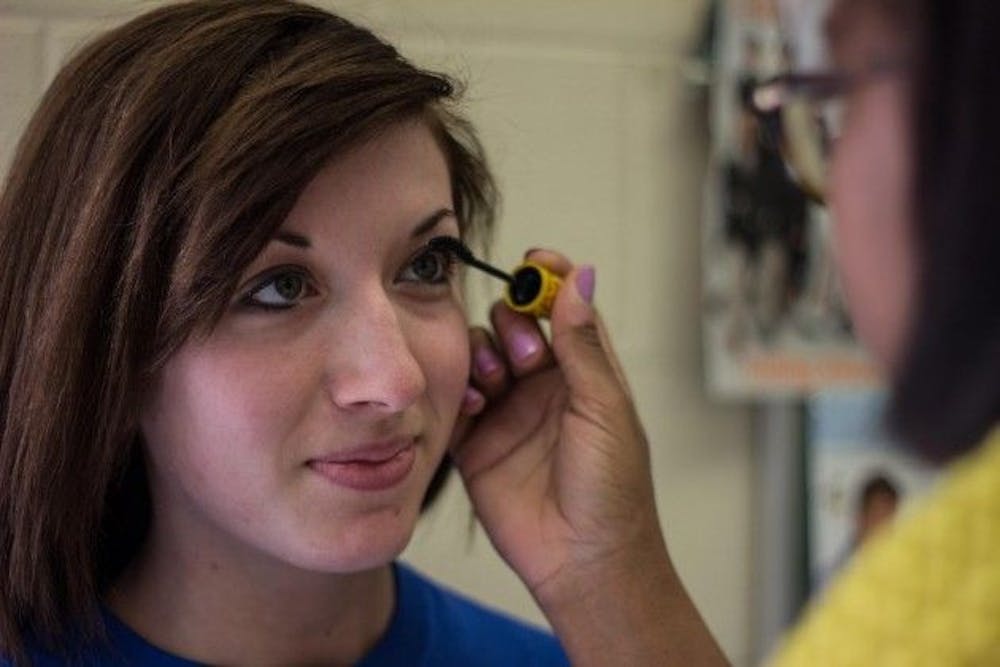Although cosmetics are helpful, when used incorrectly, they can also be harmful to both your skin and your appearance.
MAC aesthetician and sales associate Latrice Davis emphasized proper makeup application. The current senior University of Memphis political science major said the preparation of foundation is the most vital step.
"Get a nice cleanser that agrees with your skin and wash your face (then) follow that up with a moisturizer and a primer," Davis advised.
A primer is a cream or lotion applied under foundation to better the makeup's coverage.
"It makes your makeup lay better and last longer," Davis continued.
Although she noted that people with different skin types should get different products, she universally recommended oil-free moisturizers.
In addition to prepping, Davis also emphasized proper makeup removal.
"You're going to break out," she stated. "If you don't take your makeup off before bed, you're going to start seeing changes in your skin -- your skin will appear rougher (and) your pores will enlarge."
She also said people should change their products with the season.
"When the weather changes, your skin changes," Davis continued. "(If) your skin is different, you need to change your foundation."
She recommended powdery consistencies for oily skin and creamy or rich foundations for drier skin types.
She said she also feels strongly about drawing on eyebrows too heavily.
Local makeup artist Tim Moore also seemed adamant about subtlety.
"Piling on foundation is a pet peeve of mine," Moore said. "I hate it when you can look at someone and it feels like you can literally scrape the makeup off."
He said that this not only looks tacky, but it disables your pores from breathing.
U of M student Kiki Carson also knows a thing or two about makeup. The political science and foreign language major's mother has been selling cosmetics for Mary Kay for 11 years.
According to her, priming before the application of eye shadow is also important.
"To not prime is a crime," said the 20-year-old, quoting her mother's wisdom.
She emphasized this because it enables the shadows to stay on longer, and it protects the eyes from the harsh metals in makeup.
Carson also advised removing eye cosmetics at night to decrease the absorption from metallic residue and to prevent eyelashes from breaking off.
"(Primer) also makes it that much easier to take off," she added.
Although Carson knows a lot about makeup, she does not wear it regularly. She promotes taking care of your own skin instead of hiding it. She advises women to give their skin a break.
"Trying to use foundation and concealer to cover acne only begets more acne," Carson added.
She applied the same reason to dry skin and recommended people use coconut oil to aid against that especially in winter months.
"Coconut oil is a miracle-it has nutrients and minerals and is really good for your pores," she stated.
According to her, Makeup is not a cover-up and should solely be used to blend the tones of your skin.
"You should never use makeup as treatment for your skin. The problem is still going to be there. It is just makeup," she concluded.
Jacqueline De Fouw, a health educator at the Hudson Health Center on Campus had a few tips to ensure skin health in general.
"Don't take hot showers," De Fouw stated. She advised against soaking in hot baths as well because it draws moisture from your skin.
She also promoted regularly moisturizing and advised against using body lotions on the face.
"Many lotions have oil in them and can clog pores," she explained.
When it comes to acne, De Fouw cleared up a few myths. "Foods such as chocolate don't cause break-outs, but you should avoid greasy, fatty foods for your overall health," she continued.
According to her, different skin ailments are attributed to various environmental and biological causes.
For example, dark circles are an indication of increased blood flow.
"They can be caused by allergies, older people tend to have them, we get them when we're tired, and some races are more prone to getting them," she continued.
For skin irritations such as eczema, she advised getting a medical opinion.
"If you have had it before, you can just get a prescription, but if you've never seen it before, don't try to fix it yourself. You should see a doctor to get it diagnosed," De Fouw emphasized.
She said the skin is the largest organ of the body and it's the first line of defense against infection.
There are certain actions you can take to prevent certain skin issues.
The FDA recommends cleaning and replacing certain makeup items on a regular basis. Mascara, for example, should be replaced every three months. It also advises customers to avoid using "tester" products in public places because they have high chances of being contaminated.




